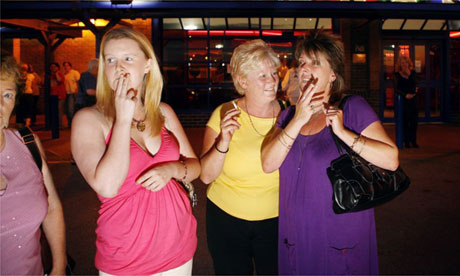
Andy Capp's the one with the fag surely? Florrie has the curlers and the rolling pin. Such is the old image of the north east of England. But Durham university health scientists are alarmed at one way in which it has changed.
Their survey has just found that women smokers now outnumber men in the region, which according to Dr Andrew Russell of the uni's Institute of Hazard, Risk and Resilience is globally rare. Stress and its worsening by recession almost certainly play a part, but why more on women? What other causes may there be?
A public discussion tomorrow, Tuesday, organised by the institute and Durham city's Forum for Health hopes to make some progress in finding out.
It's being held at the Dales Suite, Collingwood College, Durham University, South Road, Durham DH1 3LT at 6pm, and organisers are looking for leads to new empirical studies, as well as giving their own opinions and hearing others.
You need to let them know if you plan to come, via this form here.
Here's what Dr Russell says in advance:
"Men's smoking rates have declined dramatically over the past few years in the north east and now appear to be lower than the national average. Women's have not declined nearly so fast - they appear to have plateaued at a level higher than the national average.
Smoking rates are highest in areas of greatest economic deprivation and also go up in times of recession.We need to consider whether for some women, smoking is a response to stress in their lives,one of the few 'pleasures' that are relatively easily acquired.
"but the tobacco industry has had a large part to play in encouraging more women to take up smoking by perpetuating the myth of smoking as glamorous, risqué and a form of defiance. New brands come out all the time specifically aimed at women.
"We're proposing a cross-cultural study looking at women's relationship to tobacco in other societies in order to understand how best to tackle the situation in the North East of England. I'll be outlining my plans at the meeting."
His colleague Dr Sue Lewis has meanwhile specialised on trying to find out why women and girls are getting the habit so young. She says:
"We need to understand the particular issues faced by young smokers – and those trying not to be smokers – in disadvantaged communities; what particular pressures they faced when they started smoking, what factors encouraged continued smoking and what makes it particularly difficult to quit.
Our research included interviewing young people at a youth club in county Durham in an ex-mining village which, according to the national index of deprivation, is in the 10% most deprived wards in a county that is already among the most deprived nationally.
These young people spoke of the social pressures of smoking, that you're left out if you don't and at as young as 8 years old, the older kids hassle them into taking up the habit. It has become a status thing, an identity formation issue, an aspect of personhood and therefore not as simple as – and far more insidious than – mere peer pressure.
One particular young girl talked about her depression over her smoking addiction – there's clearly not even any pleasure there to offset the obvious risks.
Also plain was the ease with which youngsters gained access to cigarettes, talking of the 'fag houses' where people would sell them cigarettes in ones or twos no matter what their age."
Thoughts welcome. Anna Lynch, the NHS director of public health for county Durham will be at the meeting too.

